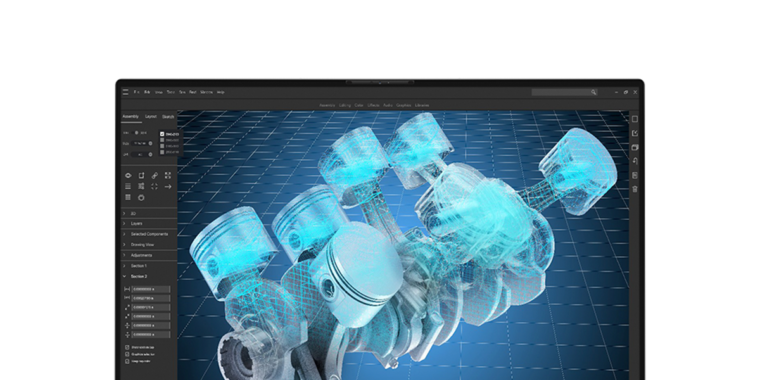
-
The Dell Precision 5750.
-
The Dell Latitude 9510.
-
The Dell Precision 5550.
-
The Dell Latitude 9410 in a clamshell configuration.
-
The Dell Latitude 9410 is also available in a 2-in-1 convertible configuration.
Today, Dell announced updates to several laptops in its office (Latitude) and professional workstation (Precision) product lines, with design changes, spec bumps, and other improvements on tap.
Dell focused more than usual on sustainability in its press release on the new laptops, noting its use of recycled materials and sustainable packaging. But for the most part, the focus is on specs bumps and small design evolutions.
Dell announced similar updates to its XPS line of laptops last week; the XPS line is focused more on personal use, with an emphasis on content creation. The Precision machines are also all about content creation, but they’re equipped with workstation-class graphics and other features aimed at professional use cases.
Precision
The storied Precision line of workstation laptops is designed for “intensive graphics processing, data analysis, and CAD modeling,” and thanks to bezel reductions compared to earlier models, Dell claims the Precision 5550 and 5750 are the smallest 15-inch and 17-inch mobile workstations on the market right now.
We’re not going to go over every competing laptop with a ruler right here, but these aluminum machines do seem design-forward in that regard, at least. Both models carry Dell’s “InfinityEdge” branding, the same that was applied to the XPS machines. That means near-edge-to-edge displays with equally proportioned, minimal bezels on each side.
Specs-wise, the 5000-series Precision laptops offer 10th-generation Intel CPUs as expected, with Core i5, Core i7, Core i9, and Xeon (W-10855M) options, with core counts from four all the way up to eight. RAM clocks in at 2933MHz and is available in 8, 16, 32, and 64GB configurations.
The Precision 5550 offers Nvidia Quadro T1000 and T2000 workstation graphics options (both with 4GB GDDR6). The 5750 drops the T1000 but adds an Nvidia Quadro RTX 3000 option with 6GB of GDDR6. Both offer Intel UHD graphics as well. As with their XPS cousins, they can be configured with either 4K or FullHD screens (maximum of 500 nits of brightness in this case) and feature Wi-Fi 6 and Bluetooth 5.0, as well as Thunderbolt 3 and USB-C ports. Either the 5550 or 5750 can be configured with a range of M.2 storage options, from 256GB up to 2TB.
Latitude
On the Latitude side, high-end performance isn’t the focus so much as sleek design and portability. The 25-year-old brand saw updates and refreshes across the entire product line. That means changes to more than a dozen products, so we won’t get into all of them here (you can find them all on Dell’s website).
The flagships are the high-end Latitude 9410 and 9510, with 14- and 15-inch displays. These, too, adopt a minimal-bezel design, but the displays are only available in 1080p, not 4K. We’re looking at up to 16GB of 2133Mhz RAM, Core i7 CPUs, SSDs, and some large-ish battery options. As one would expect in laptops for business travelers, battery life is a big part of the pitch; Dell claims up to 34 hours of battery life from the biggest battery option on the 9510. Also key for said travelers: these laptops offer LTE mobile broadband options from Qualcomm in addition to Wi-Fi 6. While the 9510 offers 5G mobile broadband, the 9410 is limited to 4G.
The 9510 weighs 3.1 pounds and comes with an array of microphones intended to make video conferencing as pleasant an experience as it can be. It’s available in both a convertible 2-in-1 version and a classic clamshell. The 2-in-1 weighs a little more: 3.3 pounds. The 9410 is a 360-degree-hinge-equipped convertible that offers up to 27 hours of battery life and a 3-pound carry weight.
It’s worth noting that the slightly-lower-down-the-pricing-scale 7310 and 7410 Latitude laptops have moved to soldered RAM, which isn’t great news for IT managers looking to upgrade business users’ laptops over time.
Dell also updated a number of other machines (besides those mentioned here) in its various product lines for business customers, including those above and its OptiPlex desktop towers and all-in-ones. In most cases, we’re mainly looking at specs refreshes.
Listing image by Dell
https://arstechnica.com/?p=1677158

